Russian cruiser Varyag (1983)
Russian cruiser Varyag (Russian: Варяг, lit. 'Varangian') (formerly-Chervona Ukraina), is the third ship of the Slava-class of guided missile cruisers built for the Soviet Navy now serving the Russian Navy.
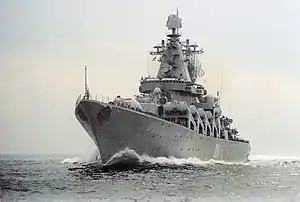 Varyag (then Chervona Ukraina) c. 1990 underway en route to the Pacific Ocean from the Black Sea | |
| History | |
|---|---|
| Name | Varyag (ex-Chervona Ukraina) |
| Namesake | Viking or Varangians |
| Builder | 61 Kommunara Shipbuilding Plant (SY 445), Mykolaiv |
| Laid down | 31 July 1979 |
| Launched | 28 August 1983 |
| Commissioned | 16 October 1989 |
| Status | In active service |
| Notes | Flagship of the Pacific Fleet |
| General characteristics | |
| Class and type | Slava-class cruiser |
| Displacement | 11,490 tons |
| Length | 186.4 m (611.5 ft) |
| Beam | 20.8 m (68.2 ft) |
| Draft | 8.4 m (27.6 ft) |
| Propulsion | 4 COGOG gas turbines, 2 shafts 121,000 shp |
| Speed | 32 knots (59 km/h; 37 mph) |
| Range | 10,000 nautical miles (19,000 km; 12,000 mi) at 16 knots (30 km/h; 18 mph) |
| Complement | 480 |
| Sensors and processing systems |
|
| Electronic warfare & decoys |
|
| Armament |
|
| Armor | Splinter plating |
| Aircraft carried | 1 Ka-25 or Ka-27 Helicopter |
Description
Varyag is a Slava-class cruiser designed during the Soviet Union as a Raketnyy Kreyser[1] or "anti-ship rocket cruiser (RKR)."[2] The development started on 20 April 1972 as a stretched version of Kara-class cruiser with the P-500 Bazalt missiles. As there was nothing revolutionary about the design of the class, Western observers felt they were created as a less expensive conventionally powered alternative to the nuclear-powered Kirov-class battlecruisers.[3]
The preliminary design started at the Northern Design Bureau in October 1972. The chief designer was director of the Northern Design Bureau Aleksandr Kuzmich Perkov (since 1979 Valentin Ivanovich Mutikhin) and the main observer from the Navy was Captain 2nd rank A. N. Blinov. The preliminary design was reviewed in December 1972 and approved on 21 August 1974.
The vessel has a standard displacement of 10,000 tonnes (10,000 long tons) and 12,700 t (12,500 long tons) at full load.[2] Varyag measures 186.4 metres (611 ft 7 in) long with a beam of 20.8 m (68 ft 3 in) and a draught of 8.4 m (27 ft 7 in). The vessel is powered by a combined gas or gas (COGOG) system comprising four 23,300 kilowatts (31,250 shp) boost gas turbines and two 8,900 kW (12,000 shp) cruise gas turbines driving two shafts for a combined 93,000 kW (125,000 shp).[4]
This gives the cruiser a maximum speed of 34 knots (63 km/h; 39 mph). It has a range of 9,000 nautical miles (17,000 km; 10,000 mi) at 15 knots (28 km/h; 17 mph). As built the cruiser had a complement of 505.[2] This was later reduced to 476 including 62 officers.[4]
Varyag is armed with sixteen P-1000 Vulkan (SS-N-12 Sandbox) anti-ship missiles (SSM) in two eight-missile launchers located amidships to either side of the superstructure. It is also equipped with 64 S-300F Fort (SA-N-6 Grumble) long-range surface-to-air missiles (SAM) in eight eight-missile launchers located aft of the funnel and forty OSA-M (SA-N-4 Gecko) SR SAMs in two twenty-round launchers located aft, to either side of the hangar.[2][4]
Varyag is armed with twin-mounted AK-130 130 mm (5 in)/L70 dual purpose guns located forward and six AK-630 30 mm (1.2 in) close-in weapons systems with two located forward atop the superstructure and four located amidships to either side of the superstructure. For anti-submarine warfare (ASW), the cruiser mounts two RBU-6000 anti-submarine mortars, each with six barrels and ten 533 mm (21 in) torpedo tubes two quintuple launchers behind shutters near the stern.[2][4]
The ship was equipped with MR-800 Voskhod/Top Pair 3-D long range air search and MR-700 Fregat/Top Steer air/surface search radar. For ASW, the cruisers is equipped with MG-332 Tigan-2T/Bull Nose hull-mounted LF and Platina/Horse Tail MF VDS sonar. Varyag mounts MR-184/Kite Screech fire control radar for the 130 mm guns, 3R41 Volna/Top Dome radar for SA-N-6 SAM control, MPZ-301 Baza/Pop Group radar for SA-N-4 SAM control and Argument/Front Door-C radar for SSM control and 3 Bass Tilt radars for the AK-630s.[2][4]
The cruiser utilises the Punch Bowl satellite link for its weapon targeting systems. For electronic warfare, the ship is supplied with the Kol'cho suite with Gurzhor-A&B/Side Globe intercept and MR-404/Rum Tub jammers.[2][4] The vessel mounts two PK2 chaff launchers.[4] The single Top Dome radar only has a 180° arc and presents a blind spot forward for the SA-N-6 missiles.[2]
The cruiser has a flight deck over the stern and a hangar. The cruiser can utilise either one Kamov Ka-25 or Kamov Ka-27 helicopter.[2][4] The hangar is one-half deck below the flight deck and is reached via an inclined ramp. The helicopter is maneuvered using a chain-haul system.[5] The helicopter can provide over-the-horizon targeting for Varyag's weapon systems.[4]
Construction and service

Laid down on 31 July 1979 at 61 Kommunara Shipbuilding Plant (Shipyard 445) in Mykolaiv as Chervona Ukraina ("Red Ukraine"), the vessel was launched in 28 August 1983, and commissioned on 16 October 1989. The warship joined the Pacific Fleet in 1990.[6] Today, Varyag is part of the 36th Surface Ship Division at Vladivostok and has a pennant number 011.
Between 5–8 June 1990, she paid a friendly visit to Kiel, Germany.[7]
While in transit from Sevastopol to the new permanent base Petropavlovsk-Kamchatsky from 27 September to 5 November 1990, Varyag and destroyer Bystry visited Vietnamese base Cam Ranh between 22 and 24 October.[8]

In 1991–1992 she was engaged in combat training, but in 1993–1994 she didn't go to sea, due to the lack of financing. The combat training resumed only in 1995.[7]
The ship was renamed on 21 December 1995.
Between 9 and 13 February 1997 the ship paid a friendly visit to the South Korean port of Incheon, returning to Vladivostok on 19 February.[9]
Between 2 and 6 October 1999, Varyag and destroyer Bystry visited Shanghai, China to commemorate the 50th anniversary of the founding of the state.[10]
Between 10 and 15 October 2002, the ship visited the Japanese city of Yokosuka to honor the 50th anniversary of the Japanese Navy.[11]
Between 10 and 15 February 2004, Varyag, destroyer Admiral Tributs and corvette Koreets visited the South Korean port of Incheon to commemorate 100th anniversary of the loss of the cruiser Varyag (1899), with commander of the Pacific Fleet Admiral Viktor Fedorov on board.[12]
Between September and December 2005 the ship led a ship detachment on visits to Visakhapatnam (India), Singapore, Jakarta (Indonesia), Sattahip (Thailand) and Haiphong (Vietnam).
Varyag re-entered service with the Pacific Fleet in May 2008 after an overhaul. During the refit, the main missile complex was upgraded from P-500 Bazalt to P-1000 Vulkan.[13]
In April 2009 the ship paid a visit to the Chinese city of Qingdao to honor the 60th anniversary of the Chinese Navy. In October/November the same year, the ship also visited Singapore.
In June 2010, Varyag, under the command of Captain Eduard Moskalenko and with the Commander of the Northern Fleet Combined Forces Rear-Admiral Vladimir L. Kasatonov embarked, made a port call to San Francisco. The visit, the first by a Russian Navy surface combatant in 147 years, featured a plaque dedication ceremony to commemorate six Russian Imperial Navy sailors who died fighting a fire in San Francisco in 1863.[14] This visit also coincided with President Medvedev visiting Silicon Valley and he once again visited Varyag as he had in Singapore in 2009. Varyag also participated in training exercises with USS Bunker Hill.[15][16]
From 8 to 11 November 2011 Varyag, accompanied by the tanker Irkut, made a port visit to Vancouver, British Columbia, to commemorate servicemen killed in armed conflicts. Varyag was escorted into Vancouver by the Royal Canadian Navy destroyer HMCS Algonquin, and Varyag's crew engaged in friendly sports matches with their Canadian counterparts from Algonquin.[17][18][19]
In 2012, Varyag participated in the yearly exercise with the Chinese Navy off Qingdao.
In 2013 the ship departed on a long voyage to the Mediterranean Sea, visiting Trincomalee (Sri Lanka), Salalah (Oman) and Alexandria (Egypt).
In November 2014, Varyag led a deployment of four Russian naval vessels to international waters off Australia.[20][21] The deployment was believed to be linked to the 2014 G-20 Brisbane summit and growing tensions between the two nations.[20][22]
_18.jpg.webp)
In early January 2016, after a visit to India, Varyag entered the Mediterranean Sea through the Suez Canal to be deployed off Syria′s shore replacing sister ship Moskva,[23] in support of Russia's air operation in Syria that had begun in autumn 2015. The ship was named flagship of the Russian naval task force positioned in the eastern Mediterranean.[24]
On 21 April 2017, the ship visited Manila (Philippines), Cam Ranh (Vietnam), Sattahip (Thailand) and Singapore.
In late 2018 Varyag completed another long voyage to India.
On 1 October 2019, Varyag, destroyer Admiral Panteleyev and tanker Pechenga embarked on a three-month deployment under the command of the Captain 1st Rank Aleksandr Shvarts,[25] visiting Muara, Brunei between 3–7 November[26] and Pusan, South Korea between 17 and 22 December,[27] before returning to the homeport on 23 December.[28]
In February–March 2021, Varyag participated in the large-scale anti-submarine, air defence and artillery exercises of the Pacific Fleet, along with a conventional submarine, destroyer Admiral Tributs, modernized frigate Marshal Shaposhnikov[29] and universal corvettes Gromkiy[30] and Sovershennyy, anti-submarine corvettes MPK-107,[31] Ust-Ilimsk, Sovetskaya Gavan, Metel[32] and MPK-82[33] as well as anti-ship corvettes R-14, R-18,[34] R-20,[35] R-29,[36] Iney,[37][38] Razliv, R-297,[39] Smerch[40] and others. The auxiliary ships present in the area during the exercise were Project 97 icebreaker Sadko, as well as tugs MB-99, Andrey Stepanov and at least four others.[41]
On 1 May 2021, in a rare event two detachments of the Pacific Fleet embarked on distant deployments simultaneously, Varyag and Marshal Shaposhnikov as well as corvettes Sovershenny, Gromky and Aldar Tsidenzhapov.[42] Both detachments were supported by large sea tanker Boris Butoma.[43] On 11 May, Admiral Tributs was also reported on a deployment, calling at Singapore between 11 and 13 May, accompanied by tug Kalar.[44] All in all, all active major surface combatants of the Pacific Fleet were deployed simultaneously, i.e. a cruiser, three destroyers and three corvettes. Tanker Boris Butoma called at Cam Ranh, Vietnam between 15 and 19 May and at Philippines on 22 May.[45] Sovershenny and Gromky held exercises in the Philippine Sea on 30 May.[46]
Between 7 and 24 June 2021, Varyag led the largest exercise of the post-Soviet Pacific Fleet that took place in the central Pacific Ocean off Hawaii, being the first post-Cold war Russian naval exercise in that area (minor exceptions being destroyer Admiral Panteleev taking part in RIMPAC-2012 exercise and frigate Admiral Gorshkov sailing near Hawaii in 2019[47]). Besides cruiser, it included destroyers Marshal Shaposhnikov and Admiral Panteleyev, corvettes Sovershenny, Gromky and Aldar Tsydenzhapov,[42] a nuclear submarine, (likely Omsk[48]) intelligence ship Kareliya[49][50] and tanker Irkut.[51]
The exercise started in the central Pacific Ocean on 10 June and on 21 June, the ships 2500 nautical miles southeast of the Kuril islands simulated an attack on the enemy carrier strike group. Prior to that, the ships operated in two groups, sailing at 300 nautical miles from each other, one of them playing the role of enemy. The largest auxiliary ship of the Russian Navy Marshal Krylov also took part in the exercise and acted as a command ship for the commander of the exercise, rear admiral Konstantin Kabantsev, commander of Primorskaya Flotilla, as well as hospital ship Irtysh[52] and MiG-31 interceptors and Il-38 and Tu-142 anti-submarine aircraft.
On 24 June, the final day of the exercise, three Tu-95 bombers, several Tu-22M bombers, escorted by interceptors MiG-31BM and two Il-78 tankers flew to the central Pacific Ocean as well. The Tu-95s delivered conditional strikes against the enemy's critical infrastructure and Tu-22M delivered strikes against the enemy's conditional carrier strike group together with Varyag and Marshal Shaposhnikov.[53] It was suggested that the exercise was an answer to the exercise Agile Dagger 2021 of the US Pacific Fleet, employing one third of the operational submarines of the US Pacific Fleet.[54]
In September 2021, Varyag conducted an exercise off Kamchatka along with nuclear submarine Omsk and 12 ships and support vessels of the Pacific Fleet. The cruiser fired a Vulkan missile, while Omsk fired a Granit missile.[55]
In October 2021, Varyag was underway in the Sea of Japan again.[56]
On 23 November 2021, Dalzavod reported on its Instagram channel that the cruiser entered its dry dock.[57]
On 29 December 2021,[58] Varyag, along with destroyer Admiral Tributs and tanker Boris Butoma, left Vladivostok for a long deployment, consisting of port calls in several countries.[59] On 11 January 2022, the warships entered the Indian Ocean,[60] and called at Kochi on 14 January 2022.[61] On 18 January 2022, the taskforce anchored in Chabahar, and reports stated that the ships plan to hold joint-exercises with the Iranian and Chinese navies.[62] On 2 February 2022, the cruiser entered the Mediterranean via the Suez Canal and linked-up with her sister ship, Marshal Ustinov deploying to the Mediterranean from the Northern Fleet.[63][64] In July 2022, Varyag, Admiral Tributs and intelligence ship Vasily Tatishchev became the first Russian Navy's ships operating in the Adriatic Sea since 1995 Volk's deployment amid US bombardment of Bosnia and Herzegovina.[65] In late July, destroyer Admiral Tributs operated off Šibenik, intelligence ship Vasily Tatishchev operated near island Palagruža, cruiser Varyag operated near Durres, while frigate Admiral Grigorovich remained just outside the Adriatic Sea. As the US carrier Truman was located in the Adriatic Sea at the same time, there were reports in media about Russian warships simulating blocking the US carrier to the Adriatic Sea.
In October 2022, Varyag, Admiral Tributs and Boris Butoma departed the Mediterranean via the Suez Canal likely returning to their bases in the Pacific.[66] On 18 November, the three ships returned to Vladivostok.[67]
See also
- Chervona Ukraina for another ship named for Red Ukraine.
Gallery
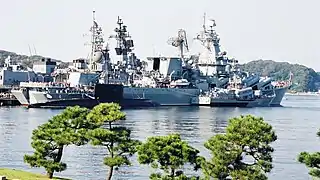 Visiting Port of Yokosuka, Japan in Oct. 2002
Visiting Port of Yokosuka, Japan in Oct. 2002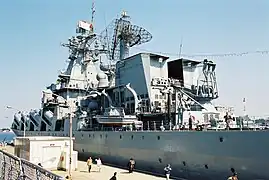 Visiting Port of Yokosuka, Japan in Oct. 2002
Visiting Port of Yokosuka, Japan in Oct. 2002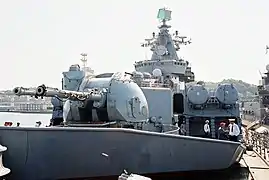 Visiting Port of Yokosuka, Japan in Oct. 2002
Visiting Port of Yokosuka, Japan in Oct. 2002 Dmitry Medvedev meeting with sailors in 2009.
Dmitry Medvedev meeting with sailors in 2009. Dmitry Medvedev visiting ship's museum aboard the cruiser Varyag.
Dmitry Medvedev visiting ship's museum aboard the cruiser Varyag.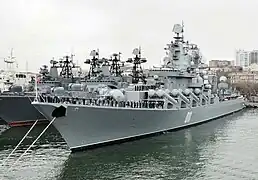 Varyag in Vladivostok, 2010.
Varyag in Vladivostok, 2010. 2010 San Francisco visit
2010 San Francisco visit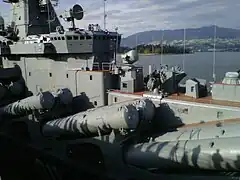 Visiting Vancouver, Canada in November 2011.
Visiting Vancouver, Canada in November 2011..jpg.webp) A close view of the AK-130 dual purpose guns on the bow with Vancouver's north shore in the background.
A close view of the AK-130 dual purpose guns on the bow with Vancouver's north shore in the background.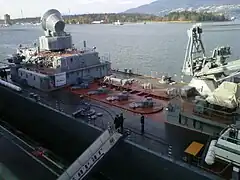 A close view of the S-300PMU Favorit SAM tubes on the mid deck, Vancouver.
A close view of the S-300PMU Favorit SAM tubes on the mid deck, Vancouver.
References
- Couhat 1986, p. 514.
- Gardiner, Chumbley & Budzbon 1995, p. 385.
- Miller, David; Miller, Chris (c. 1986). Modern Naval Combat. London; New York: Salamander Books. p. 150. ISBN 0-86101-231-3.
- Saunders 2009, p. 666.
- Couhat 1986, pp. 514–515.
- "Project 1164 Atlant Krasina/Slava class Guided Missile Cruiser". GlobalSecurity.org. 3 June 2014. Retrieved 6 October 2014.
- "Крейсер "Варяг"". oruzhie.info. Retrieved 18 September 2022.
- "Варяг (1983) — ракетный крейсер тихоокеанского флота" [Varyag (1983) - missile cruiser of the Pacific Fleet]. wiki.wargaming.net (in Russian). Archived from the original on 29 September 2022. Retrieved 11 June 2021.
- "Крейсер "Варяг" вернулся домой". www.vladnews.ru. Retrieved 18 September 2022.
- "В Шанхай отправляется гордый "Варяг"". www.vladnews.ru. Retrieved 18 September 2022.
- "Крейсер "Варяг" пройдет у берегов Японии". www.rbc.ru. Retrieved 18 September 2022.
- ""Варяг" и "Кореец" вернулись на место гибели". www.kommersant.ru. Retrieved 18 September 2022.
- "Guided Missile Cruisers Project 1164 Atlant". Russianships.info. Retrieved 26 March 2021.
- Nolte, Carl (22 June 2010). "Russian warship makes rare S.F. appearance". San Francisco Chronicle. Retrieved 22 June 2010.
- "U.S. Coast Guard Assists Russian Vessel Varyag in Training Exercise".
- "Russian warship makes rare S.F. Appearance". 22 June 2010.
- "PF Flagship Guard Missile Cruiser Varyag Arrives at Port of Vancouver, Canada". NavalToday.com. 11 November 2011. Retrieved 6 October 2014.
- "Russian warships visit Vancouver". The Voice of Russia. 9 November 2011.
- "Russian missile cruiser visits Canada". RIA Novosti. 9 November 2011. Retrieved 10 November 2011.
- Nicholson, Brendan; Martin, Sarah; Markson, Sharri (13 November 2014). "Troubled waters as Russians send warships". The Australian Business Review. Retrieved 13 November 2014.
- "Third Australian warship sent to halt Russian flotilla bound for G20 in Brisbane". News.com.au. news.com.au & APP. 14 November 2014. Archived from the original on 14 November 2014. Retrieved 14 November 2014.
- "Stephen Harper at G20 tells Vladimir Putin to 'get out of Ukraine' : Annual summit dominated by Western anger towards Putin". CBC News. 15 November 2014. Retrieved 16 November 2014.
- "Крейсер "Варяг" вышел в Средиземное море, где сменит у берегов Сирии крейсер "Москва"" [The cruiser "Varyag" enters the Mediterranean Sea, where it will replace the cruiser "Moskva" off the coast of Syria]. TASS. 3 January 2016.
- "Russian warships make Soviet-era display of might off coast of Syria". The Guardian. Retrieved 22 January 2016.
- "Pacific Fleet's combat ships leave Vladivostok for long voyage to Asia-Pacific Region". TASS. 1 October 2019. Retrieved 6 March 2021.
- "Флагман ТОФ Гвардейский ракетный крейсер "Варяг" в Муаре посетили моряки ВМС Брунея" [The flagship of the Pacific Fleet Guards missile cruiser "Varyag" was visited by sailors of the Brunei Navy in Muire]. Russian Ministry of Defence (in Russian). 5 November 2019. Retrieved 6 March 2021.
- "Корабли Тихоокеанского флота возвращаются из Кореи" [Pacific Fleet ships return from Korea]. PrimaMedia.ru (in Russian). 22 December 2019. Retrieved 6 March 2021.
- "Отряд боевых кораблей Тихоокеанского флота вернулся во Владивосток из дальнего похода" [A detachment of warships of the Pacific Fleet returned to Vladivostok from a long voyage]. Russian Ministry of Defence (in Russian). 23 December 2019. Retrieved 6 March 2021.
- "Ракетный крейсер "Варяг", фрегат "Маршал Шапошников" и БПК "Адмирал Трибуц" атаковали глубинными бомбами субмарину условного противника в Японском море" [Missile cruiser "Varyag", frigate "Marshal Shaposhnikov" and anti-submarine ship "Admiral Tributs" attacked a simulated enemy submarine in the Sea of Japan with depth charges]. Russian Ministry of Defence (in Russian). 4 March 2021. Retrieved 6 March 2021.
- "Корабли Тихоокеанского флота в Приморье и на Камчатке провели артиллерийские стрельбы" [Ships of the Pacific Fleet in Primorye and Kamchatka conducted gun fire]. Russian Ministry of Defence (in Russian). 10 March 2021. Retrieved 14 March 2021.
- "Малый противолодочный корабль ТОФ выполнил стрельбу артиллерией по морским и воздушным целям на Камчатке" [Small anti-submarine ship of the Pacific Fleet fired guns at sea and air targets in Kamchatka]. Russian Ministry of Defence (in Russian). 27 February 2021. Retrieved 14 March 2021.
- "Противолодочные корабли Тихоокеанского флота атаковали глубинными бомбами субмарину условного противника" [Anti-submarine ships of the Pacific Fleet attacked a simulated enemy submarine with depth charges]. Russian Ministry of Defence (in Russian). 20 March 2021. Retrieved 26 March 2021.
- "Четыре корабля Тихоокеанского флота в ходе учений нанесли артиллерийские удары по береговым целям на Камчатке" [Four ships of the Pacific Fleet delivered artillery strikes against coastal targets in Kamchatka during exercises]. Russian Ministry of Defence (in Russian). 24 March 2021. Retrieved 26 March 2021.
- "Корабли Тихоокеанского флота в рамках отработки курсовой задачи провели артиллерийские стрельбы в Японском море" [Ships of the Pacific Fleet conducted gun fire in the Sea of Japan as part of the coursework exercise]. Russian Ministry of Defence (in Russian). 19 February 2021. Retrieved 6 March 2021.
- "Корабли Приморского соединения разнородных сил ТОФ выполнили учебные стрельбы артиллерией в Японском море" [Ships of the Primorsky compound of the Pacific Fleet's heterogeneous forces performed artillery training in the Sea of Japan]. Russian Ministry of Defence (in Russian). 25 February 2021. Retrieved 6 March 2021.
- "На Камчатке и в Приморье корабли ТОФ провели артиллерийские стрельбы по морским и воздушным целям" [In Kamchatka and in Primorye, Pacific Fleet ships conducted artillery fire at sea and air targets]. Russian Ministry of Defence (in Russian). 16 March 2021. Retrieved 16 March 2021.
- "Малый ракетный корабль ТОФ "Иней" провел артиллерийские стрельбы по береговым целям в Японском море" [Small missile ship of Pacific Fleet "Iney" conducted artillery fire at coastal targets in the Sea of Japan]. Russian Ministry of Defence (in Russian). 5 March 2021. Retrieved 14 March 2021.
- "Малый ракетный корабль ТОФ "Иней" провёл в Японском море ракетные и артиллерийские стрельбы" [Small missile ship Pacific Fleet "Iney" conducted rocket and artillery fire in the Sea of Japan]. Russian Ministry of Defence (in Russian). 15 March 2021. Retrieved 16 March 2021.
- "Корабли ТОФ провели артиллерийские стрельбы в Японском море" [Pacific Fleet ships conducted artillery fire in the Sea of Japan]. Russian Ministry of Defence (in Russian). 13 March 2021. Retrieved 14 March 2021.
- "Малые ракетные корабли ТОФ на Камчатке провели электронные пуски крылатых ракет по надводным целям и выполнили артиллерийские стрельбы" [Small missile ships of the Pacific Fleet in Kamchatka conducted electronic launches of cruise missiles at surface targets and carried out artillery fire]. Russian Ministry of Defence (in Russian). 27 March 2021. Retrieved 7 April 2021.
- "Военный ледокол и буксиры очистили ото льда судоходный фарватер в Авачинской губе на Камчатке" [A military icebreaker and tugs have cleared the ice from the navigable fairway in Avachinskaya Bay, Kamchatka]. Russian Ministry of Defence (in Russian). 11 March 2021. Retrieved 14 March 2021.
- "RF Navy's Pacific Fleet conducts operational exercise in the central Pacific". 10 June 2021. Retrieved 12 June 2021.
- "Два отряда боевых кораблей Тихоокеанского флота отправились из Владивостока в дальние походы" [Two detachments of warships of the Pacific Fleet set off from Vladivostok on long voyages]. MilitaryNews.ru (in Russian). 1 May 2021. Retrieved 1 May 2021.
- "Отряд кораблей Тихоокеанского флота прибыл в Сингапур" [A squadron of ships from the Pacific Fleet arrives in Singapore]. Russian Ministry of Defence (in Russian). 11 May 2021. Retrieved 11 May 2021.
- "Танкер Тихоокеанского флота пополнит запасы воды и топлива на Филиппинах" [Pacific Fleet tanker to replenish water and fuel supplies in Philippines]. MilitaryNews.ru (in Russian). 22 May 2021.
- "Корветы Тихоокеанского флота в ходе учения провели артиллерийские стрельбы в Филиппинском море" [Corvettes of the Pacific Fleet during the exercise conducted artillery fire in the Philippine Sea]. Portnews.ru (in Russian). 30 May 2021.
- "Russia's Northern Fleet warships return home after round-the-globe deployment". TASS. 19 August 2019. Retrieved 17 February 2020.
- "На Камчатке торжественно встретили атомный подводный крейсер "Омск" после выполнения задач в море : Министерство обороны Российской Федерации".
- "Корабли ТОФ на учениях отработали уничтожение авианосной группы условного противника". 21 June 2021. Retrieved 21 June 2021.
- "UPDATED: Russian Navy Surveillance Ship Quietly Operating Off Hawaii - USNI News". 26 May 2021.
- "Суда Тихоокеанского флота вернулись во Владивосток после крупных учений в Тихом океане". 14 July 2021.
- "Крейсер, фрегат, корветы: кадры больших Тихоокеанских учений российского флота". 10 June 2021. Retrieved 14 June 2021.
- "Военные отработали нанесение удара по противнику в дальней зоне на учениях в Тихом океане" (in Russian). 24 June 2021. Retrieved 24 June 2021.
- "Тихоокеанский флот начал крупные маневры на фоне учений США Agile Dagger -".
- "Подлодка "Омск" и крейсер "Варяг" на учении выполнили пуски крылатых ракет в Тихом океане -".
- "Крейсер "Варяг" "отразил" ракетный удар в Японском море в ходе учений". 11 October 2021.
- "Ракетный крейсер 'Варяг' будет отремонтирован в сухом доке 'Дальзавода'". 23 November 2021.
- "Russian cruiser Varyag and destroyer Admiral Tributs visit India". navyrecognition.com. Retrieved 18 September 2022.
- "Отряд кораблей ТОФ вышел в дальний океанский поход из Владивостока". tvzvezda.ru (in Russian). 29 December 2021.
- "Отряд кораблей ТОФ вышел в Индийский океан во время дальнего похода". militarynews.ru (in Russian). 11 January 2022.
- "Russian warships call at Kochi". thehindu.com. 14 January 2022.
- "Russia, Iran, China to hold joint naval maneuvers". TASS. 18 January 2022.
- "Black Sea Fleet deployments-Wk06/2022".
- "Russia Sends Slava-class Cruiser Ustinov in the Mediterranean". 7 February 2022.
- "Russian Navy in the Adriatic sea. Why?". YouTube.
- "Russian forces in the Mediterranean - Wk44/2022".
- https://flot.com/2022/%D0%9F%D0%BE%D1%85%D0%BE%D0%B424/
Sources
- Couhat, Jean Labayle, ed. (1986). Combat Fleets of the World 1986/87. Annapolis, Maryland: Naval Institute Press. ISBN 0-85368-860-5.
- Gardiner, Robert; Chumbley, Stephen; Budzbon, Przemysław, eds. (1995). Conway's All the World's Fighting Ships 1947–1995. Annapolis, Maryland: Naval Institute Press. ISBN 1-55750-132-7.
- Saunders, Stephen, ed. (2009). Jane's Fighting Ships 2009–2010 (112th ed.). Alexandria, Virginia: Jane's Information Group. ISBN 978-0-7106-2888-6.